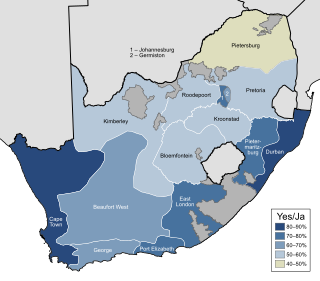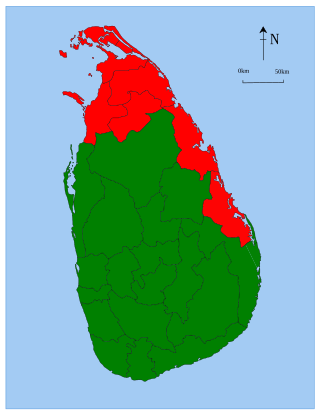
An election is a formal group decision-making process by which a population chooses an individual or multiple individuals to hold public office.

Referendums in the United Kingdom are occasionally held at a national, regional or local level. Historically, national referendums are rare due to the long-standing principle of parliamentary sovereignty. Legally there is no constitutional requirement to hold a national referendum for any purpose or on any issue. However, the UK Parliament is free to legislate through an Act of Parliament for a referendum to be held on any question at any time.

A post-legislative referendum was held in Scotland in 1979 to decide whether there was a sufficient support for a Scottish Assembly proposed in the Scotland Act 1978 among the Scottish electorate. This was an act to create a devolved deliberative assembly for Scotland. A majority (51.6%) of voters supported the proposal, but an amendment to the Act stipulated that it would be repealed if less than 40% of the total electorate voted in favour. As there was a turnout of 64% the "Yes" vote represented only 32.9% of the registered electorate, and the act was subsequently repealed.

Unionism in Scotland is a political movement which favours the continuation of the political union between Scotland and the other countries of the United Kingdom, and hence is opposed to Scottish independence. Scotland is one of four countries of the United Kingdom which has its own devolved government and Scottish Parliament, as well as representation in the UK Parliament. There are many strands of political Unionism in Scotland, some of which have ties to Unionism and Loyalism in Northern Ireland. The two main political parties in the UK — the Conservatives and Labour — both support Scotland remaining part of the UK.
The people's referendum of 1946, also known as the Three Times Yes referendum, was a referendum held in Poland on 30 June 1946 on the authority of the State National Council. The referendum presented an opportunity for the forces vying for political control of Poland following World War II to test their popularity among the general population. However, the results were forged and the referendum failed to meet democratic standards.

A referendum on ending apartheid was held in South Africa on 17 March 1992. The referendum was limited to white South African voters, who were asked whether or not they supported the negotiated reforms begun by State President F. W. de Klerk two years earlier, in which he proposed to end the apartheid system that had been implemented since 1948. The result of the election was a large victory for the "yes" side, which ultimately resulted in apartheid being lifted. Universal suffrage was introduced two years later for the country's first non-racial elections.
The 1960 Edmonton municipal election was held October 19, 1960, in Edmonton, Alberta, Canada, to elect five aldermen to sit on Edmonton City Council and three trustees to sit on each of the public and separate school boards. The electorate also decided eight plebiscite questions.
General elections were held in Italy on 26 March 1934. At the time, the country was a single-party state with the National Fascist Party (PNF) as the only legally permitted party.
General elections were held in Italy on 24 March 1929 to elect the members of the Chamber of Deputies. By this time, the country was a single-party state with the National Fascist Party (PNF) as the only legally permitted party.

A nationwide referendum was held in Moldova on 5 September 2010 on whether or not the country should amend the Constitution of Moldova to return to direct popular election of the president. Since 2001, the president had been indirectly elected by Parliament, with a supermajority of 61 seats required for election. The voters are asked to answer the following question: "Would you agree with the Constitutional amendment, which would allow the election of the President of the Republic of Moldova by the entire population?" Voters chose one of the proposed options: "Yes (for)" or "No (against)". Of those who had cast their vote, 87.83% chose "Yes". However, the referendum did not pass because only 30.29% of voters turned out, short of the necessary 33% for the referendum to be considered valid.

A referendum on extending the term of parliament by six years was held in Sri Lanka on 22 December 1982. It was the first and so far only national referendum to be held in the country. The referendum was called for by President J. R. Jayawardene, who had been elected to a fresh six-year term as President in October 1982. With the life of the current parliament due to expire in August 1983, Jayawardene faced the possibility of his ruling United National Party losing its massive supermajority in parliament if regular general elections were held. He therefore proposed a referendum to extend the life of parliament, with its constituents unchanged, thereby permitting the United National Party to maintain its supermajority.

The United Kingdom Alternative Vote referendum, also known as the UK-wide referendum on the Parliamentary voting system was held on Thursday 5 May 2011 in the United Kingdom to choose the method of electing MPs at subsequent general elections. It occurred as a provision of the Conservative–Liberal Democrat coalition agreement drawn up in 2010 and also indirectly in the aftermath of the 2009 expenses scandal. It operated under the provisions of the Parliamentary Voting System and Constituencies Act 2011 and was the first national referendum to be held under provisions laid out in the Political Parties, Elections and Referendums Act 2000. Many local elections were also held on this day.

General elections were held in Zambia on 5 December 1973. They were the first elections held since the country was formally declared a one-party state in August, with the United National Independence Party (UNIP) as the only legally permitted party. UNIP leader Kenneth Kaunda was automatically elected to a third five-year term as President, and was confirmed in office via a referendum in which 88.8% of voters approved his candidacy. UNIP also won all 125 seats in the National Assembly. Voter turnout was 39% of the 1,746,107 registered voters for the presidential election, and 33% for the National Assembly election.

General elections were held in Zambia on 12 December 1978. At the time, the country was a one-party state with the United National Independence Party (UNIP) as the sole legal party. UNIP leader Kenneth Kaunda was automatically elected to a fourth five-year term as President, with 80.7% of voters voting to confirm him in office. UNIP also won all 125 seats in the National Assembly. Voter turnout was around 65% in the parliamentary election, but 66.7% in the presidential election.

General elections were held in Zambia on 27 October 1983. At the time, the country was a one-party state, with the United National Independence Party (UNIP) as the only legally permitted party. Its leader, Kenneth Kaunda was automatically re-elected for a fifth term as President, and was confirmed in office with over 95% of the vote. UNIP also won all 125 seats in the National Assembly. Voter turnout was around 63% in the parliamentary election, but 65.5% in the presidential election.

General elections were held in Zambia on 26 October 1988. At the time, the country was a one-party state with the United National Independence Party (UNIP) as the sole legal party. UNIP leader Kenneth Kaunda was automatically re-elected for a sixth five-year term as President with 95.5% of the vote, whilst UNIP also won all 125 seats in the National Assembly. Voter turnout was around 60% in the parliamentary elections, but 58.8% in the presidential elections.

Presidential elections were held in the Democratic Republic of the Congo on 1 November 1970. The only candidate was Joseph Mobutu, who had taken power in a military coup five years earlier. The elections took the format of a "yes" or "no" vote for Mobutu's candidacy. According to official figures, Mobutu was confirmed in office with near-unanimous support, with only 157 "no" votes out of over 10.1 million total votes cast. Mobutu also received around 30,000 more "yes" votes than the number of registered voters, even though voting was not compulsory.

Parliamentary elections were held in the Democratic Republic of the Congo on 15 November 1970. They were the first parliamentary elections held since Joseph Mobutu seized power in a coup five years earlier.

Presidential elections were held in Zaire on 29 July 1984. At the time, the country was a one-party state with the Popular Movement of the Revolution as the only legal party. Its leader, incumbent president Mobutu Sese Seko, was the only candidate, with voters asked to vote "yes" or "no" to his candidacy. The results showed 99.16% of voters casting a "yes" vote.

The Reichstag, officially the Greater German Reichstag after 1938, was the national parliament of Nazi Germany from 1933 to 1945. Following the Nazi seizure of power and the enactment of the Enabling Act of 1933, it functioned purely as a rubber stamp for the actions of Adolf Hitler's dictatorship — always by unanimous consent — and as a forum to listen to Hitler's speeches. In this purely ceremonial role, the Reichstag convened only 20 times, the last on 26 April 1942. The President of the Reichstag throughout this period was Hermann Göring.

















